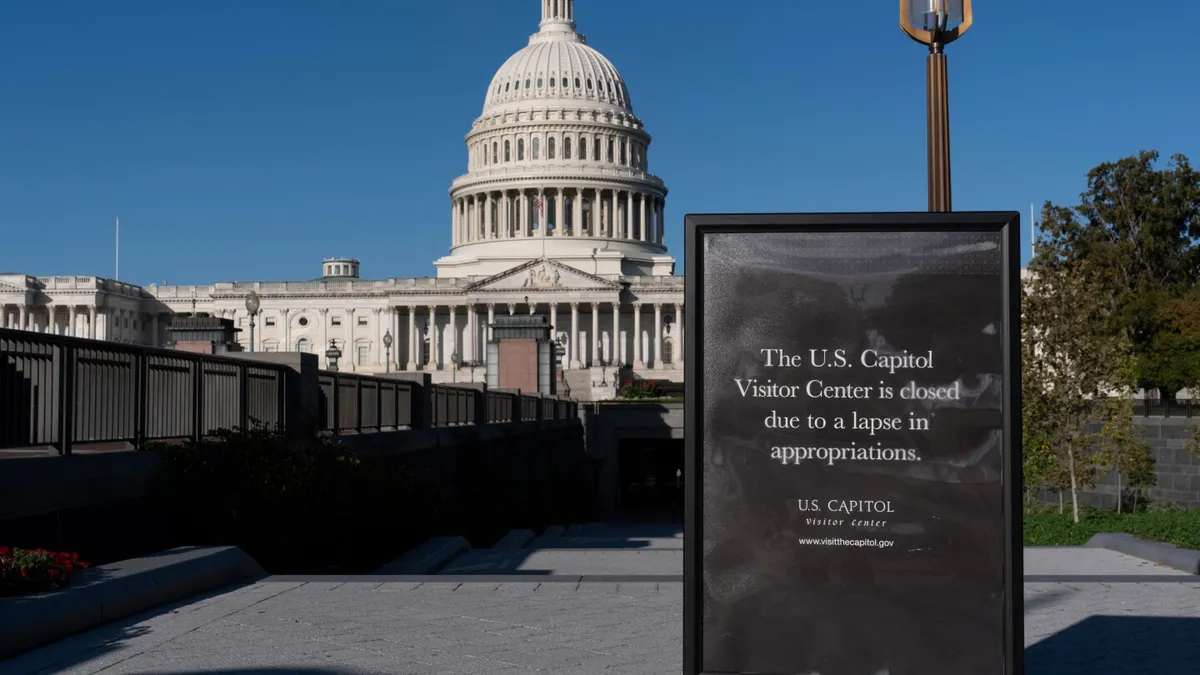
In a significant political standoff, Senate Democrats are set to reject a stopgap spending bill for the tenth time this Thursday, keeping the government shutdown firmly in place. The Democrats are unwavering in their demand for Congress to address crucial health care benefits, illustrating the deepening divide and the complexities of the current political landscape. The recurring votes on the funding bill have become a consistent feature on the Senate floor, highlighting the impasse that has left Congress largely paralyzed.
As the standoff continues, hundreds of thousands of federal workers are facing furloughs, with many more experiencing uncertainty regarding their paychecks. Senate Majority Leader John Thune of South Dakota emphasized the growing consequences of the deadlock, stating, “Every day that goes by, there are more and more Americans who are getting smaller and smaller paychecks.” He also pointed out that the ongoing crisis has led to thousands of flight delays, further exacerbating the situation across the nation.
Despite Thune's repeated attempts to pressure Democrats into supporting the stopgap funding bill, his efforts have been unsuccessful. Although bipartisan discussions concerning potential compromises on health care have been initiated, they have yet to yield any substantial progress toward ending the government shutdown.
Democrats are steadfast in their position, insisting on a guarantee for extending subsidies for health plans available through the Affordable Care Act marketplaces before they consider voting for any Republican-led funding bill. They express concerns that millions of Americans, including small business owners, farmers, and contractors, will face steep premium increases if these subsidies are not secured. With a looming deadline of November 1 in most states, Democrats predict that voters will push Republicans to engage in serious negotiations.
Senate Democratic leader Chuck Schumer remarked, “We have to do something, and right now, Republicans are letting these tax credits expire.” This sentiment reinforces their commitment to ensuring that health care remains a central focus in the ongoing negotiations.
In a bid to shift the conversation, Thune is proposing a vote to advance appropriations bills, a move aimed at facilitating some legislative progress or potentially deepening the partisan divide. While Senate Democrats have rallied around their health care priorities, they also acknowledge the urgency of reaching an agreement to prevent substantial increases in health insurance costs.
During the pandemic, Democrats successfully expanded subsidies for Affordable Care Act health plans, significantly increasing enrollment and reducing the uninsured rate to historic lows. Currently, nearly 24 million Americans rely on subsidized health insurance from these marketplaces, according to the nonprofit research organization KFF. Both Democrats and some Republicans are concerned that rising costs could lead many individuals to forgo insurance altogether.
Senator Patty Murray, the leading Democrat on the Senate Appropriations Committee, highlighted the anxiety surrounding rising premiums, stating, “I have heard from families who are absolutely panicking about their premiums that are doubling.” She emphasized the plight of small business owners who may feel compelled to abandon their jobs to seek employer-sponsored health care or opt-out of coverage entirely.
Murray warned that if many individuals abandon their health plans, it could lead to a diminished risk pool, ultimately driving prices higher for everyone. Some Republicans have recognized the potential fallout from the expiration of these tax credits, suggesting possible compromises, although there is considerable disagreement within the party.
House Speaker Mike Johnson labeled the COVID-era subsidies a “boondoggle,” arguing that increasing subsidies for health care leads to higher insurance costs. Former President Donald Trump has expressed a desire for a health care deal but has not actively engaged in discussions regarding the current shutdown.
Thune insists that Democrats must first vote to reopen the government before any serious negotiations on health care can commence. Should Congress choose to negotiate significant changes to health care, it may take weeks or longer to achieve a resolution.
As the Senate continues to navigate this crisis, Republicans are set to vote on a bill aimed at funding the Defense Department and other critical government areas. This initiative aligns with Thune’s goal of advancing the appropriations process and ultimately ensuring timely salaries for military personnel. However, any final bill will require the House’s return to Washington for approval.
Thune described this vote as a necessary step towards getting “the government funded in the traditional way, which is through the annual appropriations process.” While it remains uncertain whether Democrats will provide the support needed to move these bills forward, discussions are ongoing. Democrats have expressed a desire to review the Republican proposals to ensure they address their own funding priorities.
While these votes may not offer an immediate solution to the ongoing government shutdown, they could help shift the focus to areas where bipartisan agreement exists, potentially paving the way for future negotiations.